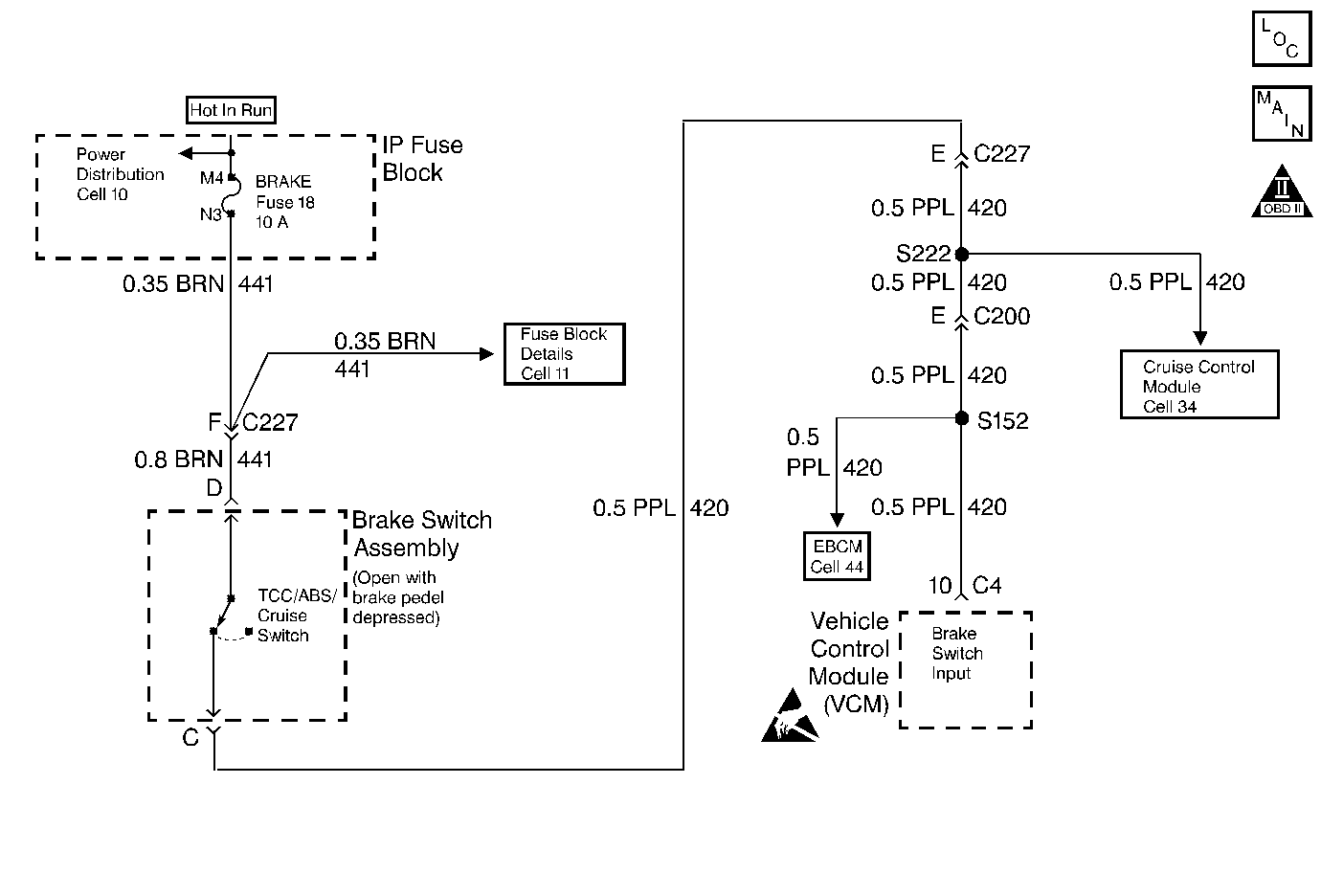
Circuit Description
The brake switch indicates the brake pedal status. The brake switch is normally-closed. The brake switch supplies a B+ signal on circuit 420 to the VCM. The signal voltage circuit is opened when you apply the brakes. The VCM uses this signal in order to de-energize the TCC Sol. Valve when you apply the brakes.
When the VCM detects an open brake switch during accelerations, then DTC P0719 sets. DTC P0719 is a type B DTC.
Conditions for Setting the DTC
DTC P0719 sets if the following conditions occur two consecutive times:
| • | No VSS Assy. DTC P0502 |
| • | The VCM detects an open brake switch or circuit (0 volts) for 15 minutes without going off for 2 seconds, and the following events occur seven consecutive times: |
| - | The vehicle speed is less than 8 km/h (5 mph); |
| - | then the vehicle speed is 8-32 km/h (5-20 mph) for 4 seconds; |
| - | then the vehicle speed is greater than 32 km/h (20 mph) for 6 seconds. |
Action Taken When the DTC Sets
The VCM illuminates the Malfunction Indicator Lamp (MIL).
Conditions for Clearing the MIL/DTC
| • | The VCM turns OFF the MIL after three consecutive ignition cycles without a failure reported. |
| • | A scan tool can clear the DTC from the VCM history. The VCM clears the DTC from the VCM history if the vehicle completes 40 warm-up cycles without a failure reported. |
| • | The VCM cancels the DTC default actions when the fault no longer exists and the ignition is OFF long enough in order to power down the VCM. |
Diagnostic Aids
| • | Inspect the wiring for poor electrical connections at the VCM. Inspect the wiring for poor electrical connections at the brake switch. Look for the following conditions: |
| - | A bent terminal |
| - | A backed out terminal |
| - | A damaged terminal |
| - | Poor terminal tension |
| - | A chafed wire |
| - | A broken wire inside the insulation |
| • | When diagnosing for an intermittent short or open condition, massage the wiring harness while watching the test equipment for a change. |
| • | Ask about the customer's driving habits. Ask about unusual driving conditions (e.g. stop and go, expressway, etc.). |
| • | Inspect the brake switch for proper mounting and adjustment. |
Test Description
The numbers below refer to the step numbers on the diagnostic table.
Step | Action | Value(s) | Yes | No | ||||||
|---|---|---|---|---|---|---|---|---|---|---|
1 | Was the Powertrain On-Board Diagnostic (OBD) System Check performed? | -- | Go to OBD System Check | |||||||
2 |
Important: Before clearing the DTCs, use the scan tool in order to record the Freeze Frame and Failure Records for reference. The Clear Info function will erase the data. Is the test lamp ON? | -- | ||||||||
Install a fused jumper from terminal C to terminal D of the brake switch connector. Did the TCC Brake Switch status change from Open to Closed? | -- | |||||||||
4 | Remove the BRAKE fuse. Inspect the fuse for an open. Refer to Electrical Diagnosis, Section 8A. Is the fuse open? | -- | ||||||||
5 | Inspect circuit 441 for a short to ground. Refer to Electrical Diagnosis, Section 8A. Did you find and correct a problem? | -- | ||||||||
6 | Inspect circuit 420 for a short to ground. Refer to Electrical Diagnosis, Section 8A. Did you find and correct a problem? | -- | ||||||||
7 | Replace the brake switch. Refer to Brake Switch Replacement. Is the replacement complete? | -- | -- | |||||||
8 | Inspect circuit 441 for an open. Refer to Electrical Diagnosis, Section 8A. Did you find and correct a problem? | -- | -- | |||||||
9 | Inspect circuit 420 for an open. Refer to Electrical Diagnosis, Section 8A. Did you find and correct a problem? | -- | ||||||||
10 | Replace the VCM. Refer to VCM Replacement, Section 6. Is the replacement complete? | -- | -- | |||||||
11 | In order to verify your repair, perform the following procedure:
Has the test run and passed? | -- | System OK |
